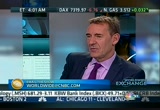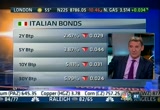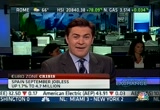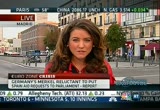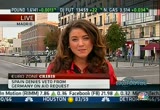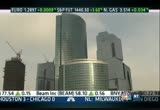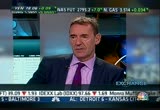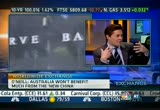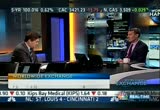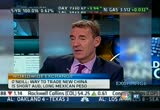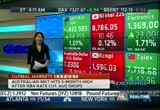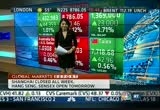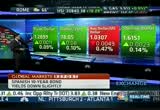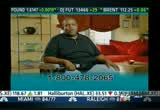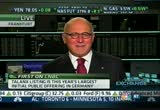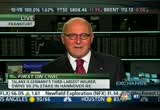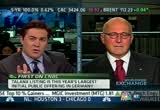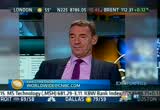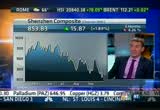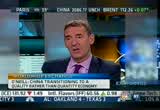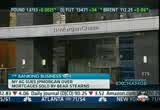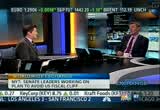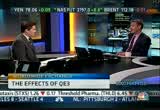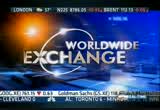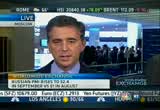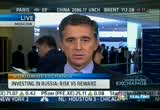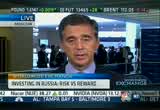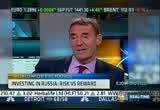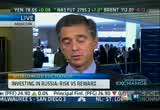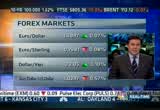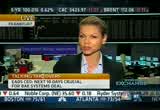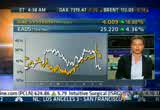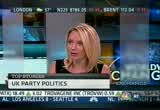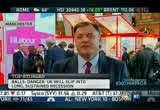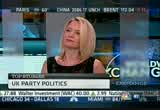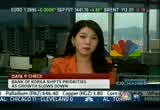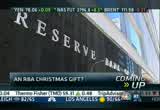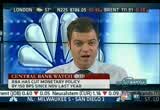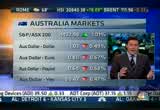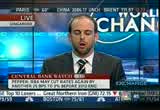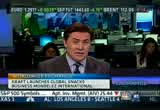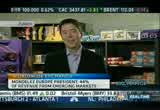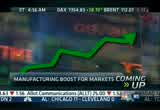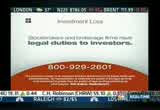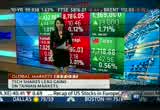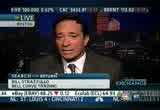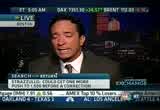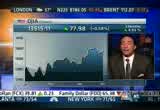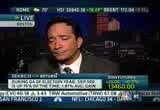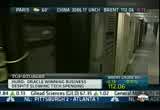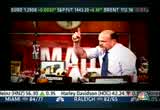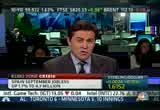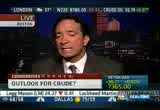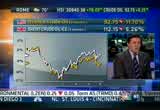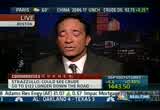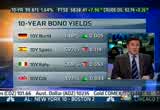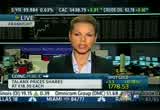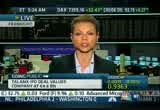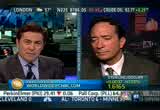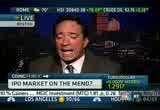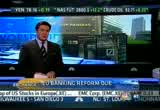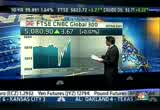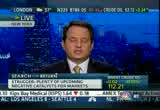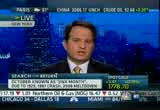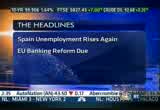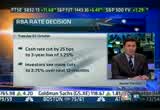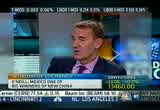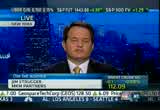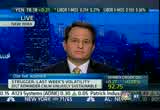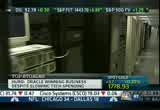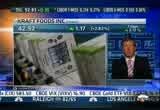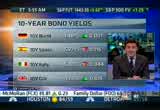tv Worldwide Exchange CNBC October 2, 2012 4:00am-6:00am EDT
4:00 am
. in is "worldwide exchange." these are the stories from around the world. spain's unemployment rate rises 1.7% in september. further weighing on market sentiment as rumors circulate madrid could ask for a bailout as early as this weekend. australian central bank has a 25 basis point rate cut, throwing up red flags on fallen commodity prices. and germany's biggest ipo does get off to a pretty good start, shares trading higher at the open. plus banks waiting a report expected on to recommend splitting retail and investment banking. we'll speak to the man in charge on cnbc later today.
4:01 am
kelly is off for the week, so jim is here with me. >> thank you. >> need extra reinforcements. and they don't come any better than having you on this morning. we had spanish unemployment out this morning and i know we have to talk china and australia, but on your travels at the moment, what do you think of the rather nonlinear as you put it in your notes, this nonlynn krer progress where we're at, the ecb waiting. economics is getting worse. >> well, actually, let me start
4:02 am
with the last point you made. and the very latest marginal information, yesterday's pmi -- >> slightly better than the flash number. >> spanish unemployment number is almost definitely a bit of a lagging indicator. the bounce in italy in particular was interesting and a further modest improvement in spain. the level of spain and italy's pmi is now higher, so everybody is highly focused on the spanish thing, but surely it's gist a matter of when they are in a program. i'm not sure if it's the big cutting edge story anymore. >> italian paper is going to give some of the best returns this year. 20%. >> you know, the underlying thing i believe post-super mario
4:03 am
when he launched his comments here in london before the owe h olympics, there should have been a shift in investments' thinking. instead of selling the policy induced rally, i think now you should buy the news induced selloff because these guys have kind of demonstrated as least when it comes to the euro's existence is that. so they're going to do some of which you might not even know about yet to keep the show on the road. whenever italy gets anywhere between 6% and 7% as this year's returns demonstrate, not the a crazy thing to have done or still do. >> so more jobs los in septem l
4:04 am
september. number of people out of work rose by 1.7% last month. this as the spanish government is apparently ready to ask for a full bailout, but is being told to wait by germany. angela merkel is reluctant to put more aid requests in front of her parliament, both sides have denied that story. but it does come just a day after meeting between the eu and sm spanish economics minister. julia is in madrid with her own thoughts on this. you heard jim says it's only a matter of time really, so we just have to work out when. that's certainly what the markets expect.
4:05 am
also the message is that it's really difficult for the germans to say, hey, these three separate times on greece, cypress and perhaps on spain particularly after they've just received the banking bailout. the biggest shift seem to be in perhaps the spanish sentiment in this article that they're ready to ask as early as this week. so critical to him. they have to think of a bailout and also the enhanced credit line. it doesn't really make a distinction between the two. but of course the budget that we got at the end of last week suggested that they were laying the foundations of course for aid and of course one analyst pointed out it read like an understanding, if it's a delaying tactic, it's a dangerous one. suggests we could see reduction in access to the financing
4:06 am
markets. they have just under 30 billion euros to refinance this month. and of course wen was in madrid yesterday speaking in a press conference, he as you mentioned said that there was going to be no bailout. he also said all the countries on the eurozone understand the conditionality, it's just a case of perhaps stepping forward. he said spain was in the driving seat and it was up to the country to decide. so certainly a difference between the article and suggestion from the europeans that they are ready and waiting, willing to act was the other phrase he used. he will consider the options and the conditionality, but it wasn't just a decision for spain, it was also a decision about the future of the and you are row, too. and given the perspective of the market, i think you can agree the longer we wait, the higher the risks. >> thanks for that, julia. so just remind you on today's show, we'll be in moscow for the russian investment forum.
4:07 am
we'll hear from the deputy. also be in philadelphia to talk kraft. the share at a ten year high. and we'll speak first to the ceo of talix. it has opened higher after the ipo. before that, the rba has surprised the street by cutting to a three year low. the central bank said the move was prompted by several factor, including china slowdown and the high australian dollar. it's widely expected to continue. you've just been in australia. >> i have. i'm still suffering from the consequences of it being a short trip. got back on the weekend. >> what do you make of them obviously being deeply impacted by -- >> well, it was all the rage
4:08 am
topic of the two days i was there, my thesis is that we're in the early stages of china going to a quality as opposed to quantity and the winners and losers will probably be pretty different. australia will certainly not be as big a win winner and it could be a loser. against that background, another task for the rba.in winner and be a loser. against that background, another task for the rba.n winner and i be a loser. against that background, another task for the rba. winner and ite a loser. against that background, another task for the rba.winner and it a loser. against that background, another task for the rba. but i'm not surprised because as i argued for a number of times the past couple days, arguably the rba has been the best world central bank inflation targeting central bank in adjusting its framework when a shock is about to hit. and for australia, the shift in china is a big shock. so the rba is right to be more aggressive, because they need to go the australian dollar down. australia and dollar are both parity when china shifting this way. >> and just explain this china
4:09 am
to quality move. everybody has been looking to the move of domestic driven model will happen quicker than we thought. >> i don't know about quicker. but we're in that phase. despite the fact the chinese cycle has slowed so much and importantly in-floegs has dropped way below that target, we have a target of 4% for the year. what are we, close to 2? they haven't done anything ic. which at a minuimum shares -- they haven't taken a number of important steps to try to develop a pension system, social health care, which are the sorts of things needed to support the consumer. you're not going to get huge consequences of that in any one
4:10 am
moment. but slowly trying to adapt and change. and i think it's clear evidence that it's on the way. >> is it possible for them to -- a lot of people wonder whether china can make this shift. >> of course. i sort of joked about it the big talk i made in singapore on the way back, soft versus hard landing. the old china has sort of already had a hard landing. that's partly why so many people in the west are so worried and in angst about it because there's a basic philosophical belief that there's only one way for china and they can't do anything other than use the central government to force the economy to do x and y. and they're trying to get away from that. as they move away from it, that part of the economy clearly shows some struggles. >> short the aussie dollar, what, long the mexican peso?
4:11 am
>> mexico is one of the big winners because they're deliberately raising wages. so low value added chinese manufacturing is nowhere near as competitive in the world as it once was. you see evidence of the u.s. getting some of it back. so mexico sort of had its breakfast, lunch and dinner the past 20 years by china appearing on the scene is probably in the early stages of regaining some of that a. so i think mexico is a big winner. southeast asia, philippines, for example. >> all right. jim, stick around. more to come from you. let's get over to asia and get a wrap of the day over there. >> thanks, ross. asian markets were mostly higher buoyed by improved data in u.s. and europe and also the rba rate cut. surprising move from the central bank helped the australian
4:12 am
market end at a five month high. resources and banks enjoyed the rally. the aussie dollar on a one month low on the back of that decision. more companies announced profit warnings as concrete signs of a fwleb al slowdown, but shipping companies rebounded on some short covering.korea, the bok a it would for growth. but the kospi ended flat. losses in hyundai motor and samsung electronics ahead of its q3 earnings guidance. the company also officially added the iphone 5 in it patent battle. airlines rallied on expectations the u.s. visa waiver will boost air travel. we'll check in with the hong kong and india markets when they're back online tomorrow.
4:13 am
>> okay, thanks very much indeed for that. let's show you where we stand just over an hour and a quarter into trade. just a little bit less for european stock markets. we are weighted to the down side. not by much. decliners outpacing advancers by a little bit less than 6:4. so ftse 100 currently down eight points, up 1.3% during the session. xetra dax fairly flat. cac 40 at the moment down a third up 2.4%. ibex up 0.2%. we saw spanish unemployment numbers. bond yields below 6%. they still are. yields lower again tomorrow, 5.83. ten year also heading lower at 5.1. not big move as considering a pretty good manufacturing ism numbers yesterday. still 1.62%. still down pretty low levels and certainly below where we were when the fed launched qe-3. euro dollar, we hit 1.2804
4:14 am
during the said yesterday. here's the aussie dollar post the rba, we got to 1.0289 was the low during the session. back above that at 1.03, but you've heard jim say australians need to get the dollar lower. bear in mind the change in china. and sterling-dollar 1.6150. next we'll head out to frankfurt for germany's biggest ipo this year. we'll hear first from the ceo of talanx.
4:15 am
[singing] hoveround takes me where i wanna go... where will it send me... one call to hoveround and you'll be singing too! pick up the phone and call hoveround, the premier power chair. hoveround makes it easier than any other power chair. hoveround is more maneuverable to get you through the tightest doors and hallways. more reliable. hoveround employees build your chair, deliver your chair, and will service your chair for as long as you own your chair. most importantly, 9 out of 10 people got their hoveround for little or no cost. call now for your free dvd and information kit. you don't really have to give up living, because you don't have your legs. hoveround replaced the legs. and now every hoveround comes with this handy tote bag and cup holder for access to your favorite items. and right now, get this limited edition hoveround america travel mug free with your hoveround delivery. [singing] hoveround takes me where i wanna go. call or log on to hoveround.com to find out
4:17 am
4:18 am
so you have to find the right way. and this is what we have done. we have pulled back a bit, we have again given -- finally pa made it through and achieved our goal. >> what are you going to do with the money that you're raising? are you going to finance growth? where is that growth going to be? >> well, we are using it to finance our organic growth, particularly in brazil, mexico, poland and turkey. we are spending to repay some of the debt in poland and we are converting in to hard cable. >> you're an industrial insurance. just describe to us, what's happening with the market and the premiums? >> well, to be honest, we are not only an industrial insurer, we are a mixture. industrial business, retail business and reinsurance business. the markets right now in the
4:19 am
reinsurance business are very good. premiums in the german auto business and retail business are rising. and also in some lines of the industrial business. so the overall environment for the insurance industry is very good. your free float is about 20%. will you stop here for a while or will you raise money in the future? >> we'll raise money in the future, however, not for the next 24 months. we are sufficiently capitalized now after this ipo on for the next 24 months, but there will be further capital increases in the future. this is just our first step in to becoming a listed insurance company. >> all right. and just give us your view where we stand at the moment with the world economy. because it's interesting where you're looking at your operations. eurozone still in the grips of
4:20 am
recession or low growth, weaker growth in asia. just give us your sense of how you view the world and how it transfers back into your business. >> i'm 100% sure that the euro will survive. the euro is instrumental for the future of europe. the emerging market particularly in brazil and mexico are very interesting growing markets for the future. and also the middle and eastern european market particularly poland. and don't forget that the insurance have i follows different cycles than the regular industry. and therefore we now have a very good market to couple with. >> okay. thanks for joining us and congratulations on the float this morning, as well. >> thank you very much. he's got your view of the world.
4:21 am
>> 100% certainty the euro will survive. >> as an insurer, one would never think -- >> involved in risk management. >> they must be buy something protection somewhere. that's their job. poland, mexico, brazil. >> mexico is certainly a winner of some of the shifts going on. china's role is becoming brazil's number one export market, so that could change a little bit. but importantly as end i can't has not gotten as much attention, but brazil's come up with a few supply side reforms during the late summer and early autumn. or our late summer and early autumn. >> another country where the middle class is developing. just because i don't want to
4:22 am
leave the china discussion completely, the thing is how you are supposed to as an investor which is an important question here, how you're supposed to play. because the shanghai composite has been multiple underperformer this year, down 10% and others have been up 10% in the u.s. so the question is actually are you tell playing companies with exposure rather than direct in to the local market? >> this is the most fascinating thing to me in the word rigld r now. you have this main market continuing to underperform. and many reasons why it's the case. one of which is the chinese authorities aren't motivated by the same things as the rest of us and trying to achieve this change in their growth. so i think you have to have a number of things, but in addition, it's probably now going to get trickier. because if we're going to a more quality china and less quantity,
4:23 am
then some of the big global winners of the pastal winners. and it is conceivable that some of the luxury winners won't be quite as prominent. the call of my sort of thesis, i'll call it luxury light. you got to be investing in the things where the consumption of which chinese earn as opposed to production or let's just say weird ways of obtaining the wealth. because there is an effort to try and -- it's not quite so fashionable to be the extraordinary amount of gifting that's been going on. so i think it's a really good time to be a true stock picker in this regard. this is where true alpha generators in the stock business should be coming to the fore.
4:24 am
. there's an underlying macro cramer, but a lot of changes going on. energies and energy efficiency. many aspects to it. >> other stories today, a bid to prevent another financial crisis, the review led by bank of fin len governor is expected to call for a separation of retail and investment operations. the report will also call for bonuses to be paid in debt. we'll hear from the central bank later today. meanwhile steve hester has called for banks to readjust back to a more customer focused approach. speaking at the london school of economic, he said lenders need to restore good customer service to regain trust of the public and rbs is the poster child for what went wrong in banking. and eric snyderman is suing
4:25 am
jpmorgan. the suit partly the result of a federal mortgage task force formed in january. investors lost around $22 billion and more than 100 securities. jpmorgan says the suit involves actions taken at the behest of the u.s. government. jpmorgan stock closing up 1.2%. and "new york times" says u.s. senate will try to use the lame duck session to reach a comprehend len sif deal to cut the deficit instead of a short term solution. lawmakers will reportedly agree on a specific target likely around $4 trillion over ten years and they would vote to put off the automatic tax hikes and spending cuts set to take effect in january. but with the deficit coming down payment to signal how serious they are. jim, how sdw this get resolved?
4:26 am
>> well, i haven't heard that sister, but that's what we've been picking up, that in the background of all these guys working on the deal already. soon after the election, our best guess is that there will be one. not too different from that story actually. >> qe-3 meanwhile, how does that play? does that continue to support lift asset prices? how do commodities get in the wash between slowing chinese growth and fed action? >> that's a good question. because i think it's a big one. i think we're not three weeks into qe-3 yet and the populous mind set of the markets is that we're done qe-3, let's move on to whatever's next. qe-3 is in my opinion very different from previous qes. the feds tip toe down a path of what i call nominal gdp targeting. we're tying it directly to real
4:27 am
economic outcomes. so they're saying they're not going away and they've opened the door to it already without considering more. so it's a big thing and it's particularly helpful to the housing market. and it may have some consequences for short term inflation expectations. i think it's a big one and it's very good for asset prices particularly equities. >> we'll go to russia in a second. if you can stick around, that would be very helpful. still to come, we'll be joined by the deputy.
4:30 am
1357bish unemployment rate raises, rumors circulate madrid could ask for a bailout as early as will weekend. banks waiting a report expected to recommend splitting retail and investment banking. we'll speak to the man in charge. banking finland governor on cnbc later today. australia, kra central bank surprises with a 25 basis point rate cut.
4:31 am
russia president putin will address leading businessmen and policymakers at the russia forum ins moscow. joining us from there now deputy ceo of the vtp group. thanks for joining us. we saw pmis, russian manufacturing expanded at it fastest pace in four months in september. what's your view of the economics of the country at the moment? >> well, good morning. i think we're expecting a slower paces in the economy for the second half. we forecast a growth of the economy around 3.5% for the second half. >> and what does that mean for you some do you need to raise more capital? if the economy is slowing, you'll get more shocks, did vtp need to have more capital?
4:32 am
>> in terms of asset growth, we've seen a very healthy year again. we're coming from 2011 when organically we grew assets by over 35%. so eventually well need more capital to finance the growth and this is something that we have been discussing with the government in line also with the plan of our main shareholders. >> how long before we know about those plans? >> well, there was just a very important privatization for burbank. i think we're mindful of maybe not coming with a second offering from a bank too soon. we also have raised a billion
4:33 am
dollar tier one capital in july and we've strengthened the capital by reducing the asset base. so we would expect probably a transaction next year, but it depends to market condition of course. >> ricardo, this is jim here. you've got the president with you at your events today. are you expecting any sight sxooiti in exciting things in his comments? the world is waiting for him to suggest changes to sort of raise or take out the risk premium a bit in russia. any views on any of that? >> sure, we expect the president of the russian federation to join us for the second session of the meetings this morning. i would not expect any major announcement. the purpose of his visit to the forum that attracts more than 400 investors is to try to answer direct question from
4:34 am
investors that are sitting in the main hall here. it can always be very interesting to hear the direct questions to the president of the country, but i don't know if there are any special announcements. >> what's your sense of what russia needs to do? >> what is interesting particularly hearing ricardo's answer about the economy, russia is oddly one of of the four brics that have positively surprised cautious expectations growth wise this year. and again, you hear people talking about expecting growth to slow. that's the same as people thought to start the year and it's been stronger than they thought. so in the near term, the hurdle for them to positively surprise
4:35 am
si sick likely isn't huge. a huge discount to the rest of the world. because people want to believe. people want to believe in the rule of law for business. there was a great hope in many of the same 200 business people would say something and he didn't. and people want to hear something that there are changes of a foot. >> which brings us back to that point and whether we'll get anything more this afternoon. >> well, jim is absolutely right. trading at almost 50% it is count to a country like brazil. there is substantial it is count that is the intrinic rush of russia. one of the steps that the government is taking is to really be more open, more transparent. this event with direct access to the heads of the government and
4:36 am
there are also several key ministers joining us. it's a way to try to convince capital that of course there are some concerns, but there is also great opportunity for business in russia. conditions and valuations are extremely attractive compared to other bric countries. >> ricardo, thanks for that. jim, thank you, as well. >> thanks for having me on. >> jim o'neill. as far as european stocks are concerned, after good gains yesterday, a little softer this morning. ibex up a quarter of a percent. bond markets the key thing is that ten year yields continue to decline in spain. 5.79% just over 5% in italy. and on the currency markets, euro-dollar's rebounded. we got down to 1.28. nearly flat during the session.
4:37 am
back up to around 1.29. dollar-yen coming in at 78.08. tom enders has called for a quick ending surrounding the proposed merger with bcht ae systems and eager to close the $45 billion tie up and ease concerns ahead of a uk regulatory deadline on october 10th. speaking in london, he said investors were reacting badly and the uncertainty can't go on much longer. for more we're joined by patricia in frankfurt. that's the question. he says the uncertainty complaint go can't go on, but that's all i see going on. >> absolutely. because so many parties have very big and important interests especially state interests in this potential merger deal. so it was definitely a move to pull through the merger. but i think they did admit that the conversations with the governments are rather tricky at
4:38 am
that stage and that he might not be prepared to prolong beyond the 10th of october simple will he because it could be damaging to the individual comes involved. eads, bae and perhaps also daimler. remember what is at stake is that france was a really big stake of about 9%. germany wants the same stake as france. the uk doesn't want to have its business relationship with the u.s. safe guarded. remember that bae has about 40% of the total revenue coming from u.s. business. so all in all it's going to be very much a tough deal to pull through. it's all about politics, it's all about defending the interests and especially golden share or a blocking interest together between germany and france that can block any kind of 75% majority needed to do any kind of decision. now, it comes with the size of the deal, it's worth about 100
4:39 am
billion u.s. dollars. 220,000 employees. the merged entity would have. which is about 20% more than the u.s. rival or about twice as much as lockheed martin. so i think if it's tough and difficult to pull through, they might walk away. the market seems to be misled thinking he might do the deal out of necessity, but he says it's out of opportunity. >> all right, patricia, thanks very much. just as we let patricia go, german september new car registrations down 11% on the year. meanwhile over here in the uk, conference season in full swing. opposition labor party currently under way. becky will be heading there and she joins us now onset. >> i'm heading to the conservative party conference
4:40 am
next week. we care about that from a direct policy point of view. but the labor party are doing their best to make themselves look states man like in the conference this week. leader of the main opposition party will today be making his pitch to the country's next political leader. speaking at that labor party conference which is being held in manchester, they will try to contrast themselves by talking about his own humble background. speaking yesterday, the shadow chancellor here in the uk said the current government will have a viable plan to fix the country and needs direct investment. >> i don't think monetary policy can do the job. we do need some kick start action right now, because if not, what happens? as i said, we are not just in recession. our borrowing is going up, our deficit is going up because you've not got people at work paying tax. so there's been a right of myth for two years the only way to get the deficit down is through
4:41 am
spending cuts and tax riders. the faster you go, the better. it's not worked in britain. and i'm afraid we're making a 1930 mistake all over again. >> it's easy their position to say this plan's not working, but the coalition with the conservative party with the junior partner very much sticking to plan a even these in some circles particularly in labor circles it's not proven to be particularly popular. and i think they'll try to play up his working class credentials because the leading conservative party very much has this posh boy image. lots of educated members of the cabinet. it's pretty hard for the average working class britt to at that time message from someone they perceive to be wealthy independently. >> not that they're putting necessarily any -- the thing is,
4:42 am
you're 2, 2 1/2 years on out from an election, so in need for any policies. >> no, for quite some time. and the conservative party conference is the first time we've had this new reshuffled cabinet. and we have half of the current parliament done and dusted. they're positioning themselves now for the implementation part as i've been putting it, with which is where the incumbent parties will try and make everything happen that they promised to make happen. so this time around in the conservative party conference, they'll have a chance to do that. george osbourne is speaking alongside the new guy who has the transport job which really puts heathrow right back into the spotlight in terms of infrastructure. >> also fascinating to see in that light presuming johnson giving a speech. >> he is on tuesday.
4:43 am
>> and that will be fascinating to compare that with everybody else's. >> he insists he's not going to -- >> no, just on that transport issue, as well. a whole number of reasons. beccy, good. when are you going up there? >> sunday. >> and you're up there -- >> until wednesday. sunday after the half marathon that we're doing with steve. >> fantastic. there you go. thank you very much. >> and rod the director. >> that's right. >> i'm slightly -- i'm a little gummed up in my ear. there we go. who is directing this is this over in south korea, the possibility of another rate cut next week is rising. here's more from seoul. hi rhie. >> hey, there, ross. september consumer price rose 2%, well below the target of 3%.
4:44 am
so despite higher prices for oil and things like vegetables after the typhoon last month, inflation a not a major concern here. what is, though, are yesterday's september which poexport figure. exports fell for the third straight month. as of today we saw factory output levels softest since early 2009. all of this build as case for the bank of korea to cut rates by 25 basis points and they in fact said they will switch over priorities from price stability to encouraging growth. after such a clear signal here next week's balancing act shouldn't be too difficult for the policymakers here. back over to you. >> thanks for that. still to come, our next guest believes there is more bang for its buck if the rba decides to cut rates again. it's all got to do with christmas.
4:48 am
sydney. >> it was a close call for the reserve bank which is lowered interest rates by 25 basis points, the first move since june of this year. the market was divided on whether the reserve bank would cut rates at today's meeting given it had not flagged any imminent reduction in it most recent board minutes. the latest move means the central bank has now cut monetary policy wouldby 150 bas points since november of last year. reserve bank saying it was appropriate for policy to be a little bit more accommodative and cited a weakening global picture saying risks demain to the down side. in particular china where it says uncertainty about the near term of chinese growth rate is greater than previously thought. it also referred to the retreatment seen in commodity prices and subsequent impact on the australian economy and concerns about australia's terms of trade falling off from the record pace. australian share market rallied on the news with the struggling retail sector seeing a bounce
4:49 am
and predictably the australian dollar headed south on the news. back over to you. >> matt taylor joining us from sydney. jim o'neill said the aussie dollar needs to get weaker. we debt go below 1.03 briefly, but is it going to weaken if we expect more rate cuts? >> i think it will struggle to weaken in an environment where we have u.s. federal reserve embarking on what's likely to be an open-endeded quantitative easing program. i think in an environment like that, we're likely to see carry trades continue to be popular, the u.s. dollar to weaken. and partly that's because they have removed a lot of tail risks around a sharp slowdown in global growth, although we're not seeing that just yet. >> i suppose if it doesn't
4:50 am
weaken a huge amount, it does help the rba out in terms of its inflation target, right? >> yes, it does. that is one thing that a higher currency will do will keep your import prices low. however, i think the rba have been somewhat frustrated that the exchange rate, australian dollar hasn't acted in its normal way as a buffer against lower global prices for australia's commodities. >> we've had the resources minister saying the mining boom is over. he said these comments a couple times now. if there is a structural shift going on in china as jim was saying earlier and we are now, you know, moving away to consumer led growth, what are the long term structural implications for australia? >> well, i think as well as the long term implications, we've actually seen some near term implications for australia. the chinese policymakers, the pboc, have been quite happy to see growth come in lower than
4:51 am
perhaps they would like to ensure that this rebalancing away from investment, away from perhaps export led growth towards who are consumption and privately led growth. that transition is something which is having an impact on the us australian dollar. lowering commodity prices and also likely going into the end of the year. ultimately we think that the stimulus that has been provided by the chinese policymakers is enough to stabilize growth, but unlikely to be enough to see a quick turnaround in chinese gdp growth. >> so you think there will be another rate cut before christmas. when would you advocate that? >> we think we'll get another 25 basis point rate cut either in november or december. some of the reasons why we think it will come before year end as opposed to after the end of the year is that he with think the
4:52 am
rba is keen to stimulate the nonmining sector of the australian economy. and of course what it ultimately comes down to is consumer spending and we know that around christmastime, that is a time where consumer spending does pick up, so rate cut before then makes sense. the reasons why we might think it's november rather than december are that we get an accompanying statement on monetary policy from the rba. basically this includes their forecasts of gdp, of inflation, of the economy. so it would make sense that if they were to move once before the end of this year, it would be the november meeting that they would probably favor. >> good to see you. thanks for that. kraft foods has officially launched it split off of its snack business. aiming to take on rival frito lay in new markets around the
4:53 am
world. we spoke to their european president earlier today and this is what he had to say about the rationale for the split. >> strategic wisdom and financial wisdom associated with this split is quite sound. what we're doing is we are creating two distinct enterprises. in the case of the international, it's a great company with single know cuss and that is to create delicious moments of joy through our iconic snacking portfolio. so the first is our geographic foot pribts. 44% of our revenue will be coming from emerging markets. obviously benefiting from the growth there. 37% from right here in europe. and less than 20 in north america. the second key point is these great snacking categories.
4:54 am
you may know snacki ining as a behavior is growing. and we have strong leadership positions with iconic brands like cadbury that we can really lempg leverage to our advantage. sg sg >> the snack business is big in asia and getting bigger and that seems to be where the major growth potential is. so walk down the road with me on this one. if you look at the list of the top ten snack foods severals ll china, they're still dominated by chinese companies rather than kraft or nestle or pepsico. so how do you make this story more exciting for investors rather than, you know, us dwelling on an issue of corporate division at this stage? >> well, as i said earlier, the snacking categories for starters are agreeing much faster than nonsnacking. so it's a great place for a company to be.
4:55 am
on top of that, i think given our strong positions in these categories, we'll take china as your example, in china, we have over an $800 million business. it is rooted iniscuit business, oreo is now the number one biscuit in china and i think underscores the power of a global brand and global platform in a new market like china. we've recently launched as you may know a major gum initiative with our stride gum into china. and obviously since we're the world's largest chocolate company, the world's largest biscuit company, the world's largest candy company, there's plenty of scale, innovation platform, tremendous iconic brands that we can bring across the bric markets, brazil, rush sharks independe russia, india, china. and given our geographic footprint, 44% of our revenue from these market, it adds up to
4:56 am
a compelling growth story. >> so does that mean there will be a major acquisition of a local competitor? >> as i'm sure you can appreciate, i won't speculate on specifics around our mergers and acquisitions activity. what i can tell you is i feel very good about our current portfolio of brands, about our exposure to key geography ifies key categories. so with that, we have everything it takes to win even in this challenging environment and deliver on the guidance we provided a few weeks ago. >> that earlier this morning on european "squawk box." stay tuned, we'll be speaking to an analyst who expects strong earnings growth for monday today lease. we'll talk u.s. market levels.
5:00 am
this is "worldwide exchange." here are the headlines from around the world. spain's unemployment rate rises 1.7% in september as rumors circulate that madrid could ask for a bailout as early as this weekend. banks waiting for an eu report expected to recommend splitting retail and investment banking. we'll speak to the man in charge later on cnbc today. jpmorgan facing a lawsuit which they will contest. and australian central bank surprises most with a 25 basis point rate cut.
5:01 am
if you've just joined us state side, a very good morning to you. welcome to the start of your global trading day. kelly of course away all week. as far as u.s. futures are concerned, we are indicated higher. and you are pea european stocks, good gains yesterday. a little softer this morning, but we have turned things around. you can see where we're on green. ftse up #.3%, now flat. xetra dax up 1.5%. now up on 0.4%. the cac 40 is fairly flat.1#.3%. xetra dax up 1.5%. now up on 0.4%. the cac 40 is fairly flat..3%, . xetra dax up 1.5%. now up on 0.4%. the cac 40 is fairly flat.
5:02 am
spanish market up 1.1%. this as we continue to see yields heading lower this morning. ten year spanish yields down. italian yields getting back to the flat mark. treasury yields slightly higher at 1.631. euro dollar back over 1.29. we did have a report unsubstantiated that spain looking ready to ask for a bail outwhile germany saying delay it a little bit. aussie dollar, we have seen it weak. no surprise.ussie dollar, we ha weak. no surprise.
5:03 am
what about the asian trading session? only one lady can give us the answer. >> most asian bourses gained ground helped by improved u.s. data. resourced enjoyed the rally. the nikkei dipped to a new low. signs of a global slowdown, but shipping companies rewoubounded short covering. the central bank announced it will aim to support growth. but the kospi ended flat. losses in hyundai motor were offset by gains in samsung electronics. the company also added the iphone 5 to its patent battle in the u.s. technology shares lent support to the taiwan market.
5:04 am
mainland china bourses remain closed for the whole week and we'll check in with the hong kong and indian markets when they resume trading tomorrow. back to you. >> thanks very much for that. so that's where we stand right now ahead of the u.s. trading day. october known as a jinx month for u.s. markets because of historic crashes in 1929 and 1987, but how october goes doesn't always translate into a negative for the entire fourth quarter. since 1980, the fourth quarter has traditionally been the best quarter of the year for both the dow, s&p 500 as well as the nasdaq. joining us is partner at bell curve. morning, bill. good to see you. the thing is, we've had a pretty good third quarter, pretty good year, so how does that set us up from a technical point of view?
5:05 am
>> well, i think there are two strats that we're looking at. short term over the next month before the election, i think the market's in a holding pattern. i'd call it 1400 to 1500 in the s&p 500. i think with the open end quantitative easing, i can't see us trading much below 1400. on the top side, if you get an opportunity around 1500 to take some profit, and even get short. i think that makes a lot of sense for a couple reasons. up around 1500, you'll hear people talk about a triple top. and if you get up to 1500 before the election, you can lean on the volatility of the election and also the resolution of the fiscal cliff. and the much bigger question is where is the market after the dust settles post election.
5:06 am
so that's something later in the year we'll see how it plays out, but that will set the tone really for i think the next 12 to 18 months. >> so the dow, not far away from it all-time closing high. does that make you a little nervous? >> well, look. like i said, you you see some of the major indices close to important highs. that's why i think you get the s&p up to 1500, and the dow up more, it will make sense to take a little money off the table. but i think the much bigger question is once we see the r s results of the election, once the fiscal cliff is dealt with, where are we in the bigger scheme of things. if the s&p is trading around current levels, i think we're this great shape going into 2013 and maybe 2014. so again short term we'll just play it as a range.
5:07 am
1400 to 1500 in the s&p. bigger picture, i really want to see how things settle down once we get through these major fundamental events. >> how much does it matter what the result in the election is just as long as we have a clear cut result? >> that's a good point. i think right now one of the things that's difficult is that the market never likes to deal with uncertainty. i think once the election is over and we find out who the next president of the united states is, the market will adapt accordingly. but right now, the difficult thing is we don't know who that will be. and again, you have this issue with the fiscal cliff hanging over everybody, as well. that's why i think if you can push the market a little bit higher here, get it up another 3%, 4%, that's a great opportunity for people watching the show to pair back their equity exposure a little bit, take some chips off the table. and for people a little bit more aggressive. even play from the short side.
5:08 am
>> all right, you'll stick around for a little bit more, get your view on foreign markets from the perspective of you in the u.s. meanwhile, other stories today, new york attorney general eric snyderman is suing jpmorgan over mortgage backed securities sold by bear stearns. jpmorgan bought bear when it collapsed in 2008. it alleges bear didn't ensure the quality of the loans it sold in 2006 and 2007. investors lost around $22 billion and more than 1 oof t00e securities. jpmorgan stock in the u.s. closing up 1.2%. speaking to maria bartiromo, oracle says customers are starting to spend more of their
5:09 am
i.t. budget. >> there isn't a customer we don't have who is on an austerity plan and innovation agenda at the same time. people are trying to save money at the same time to free them up to be able to invest. >> don't forget tune into u.s. closing bell later today as maria sits down with larry ellison for an exclusive interview at 4:00 p.m. eastern. we'll take a short break. still to come on this morning's "worldwide exchange," we'll be in madrid, the latest unemployment data put further pressure on the spanish government to ask for a bailout.
5:12 am
today from around the world. the bailout rumor mill working overtime for spain. the country sees unemployment rise again in september. banks a wait an eu report which is expected to recommend splitting retail and investment banking. and jpmorgan is hit by a lawsuit over bear stearns mortgage securities. the bank says it will contest the charges. spain saw more jobs lost in september as the crisis and austerity measures continue to weigh on the labor market. the number rising by 1.7% last
5:13 am
month, has now hit 4.7 million. jule septemb jules joins us. a report saying they're ready to ask for assistance, but apparently the germans saying you can hang on. interesting. >> yeah, it is an interesting article. i think is the lack of distinction between a full bailout for spain and also this enhanced credit line in the ecb bond buying. they don't seem to draw a distinction to that which sets slight alarm bells off. but with regards to the german politics, i think that makes sense. i think it makes sense for the germans to say we have three issues here, and to get those signed off, going back individually on those. and schaeuble said spain doesn't need a bailout and actually just needs market confidence. i think the biggest shift here would be from the spaniards who have been backtracking but not necessarily giving any
5:14 am
indication that they're willing to ask for for a bailout at all. so for them to be instantly ready to do this weekend is certainly a shift. some would argue perhaps there is the possibility that authorities here are muting the possibility, but they laid the ground work in the budget we got last week. so i kind of discount that, too, really. the economic affairs commissioner was here yesterday and he in a press conference suggested that the ball was it firmly in spain's court, that they stand ready to act and that he had no official request for a bailout as of yet. so it's delaying technique and it's a risky one. threatens perhaps further access of spain to the markets. they have two year, three year and four year auctions coming up on thursday. so that is an interesting test. ultimately what we've seen from the markets is that spreads have come in december spite the slight widening last week. so for now at least the market
5:15 am
believes this is a when rather than an if question. and i guess i finish on what he said when he threw the gauntlet down over spreads. if he doesn't ask for a bailout, perhaps he gets pushed. back to you. >> yeah, as jim said earlier, it's a nonlinear path that we have to travel. >> i agree. >> don't know where it's going. all right, thanks for that. meanwhile greece's international lenders are playing hardball with inspectors asking for more details on the country's austerity plans for 2013 and 14. the finance minister says troica has asked for krclarification. advisers will outline proposals in a bid to prevent another financial crisis. the review expected to call for a separation of retail and
5:16 am
investment operations. financial times says the report will also call for bonuses to be paid in debt, which would then be wiped out if a bank failed. we will be hearing from mr. llikanen later came on european closing bell. or you could catch it on the bell on cnbc.com a little later. now, what is interesting of course is despite the weakness in the global economy, the rba cutting rates again today, look at oil prices. brent still trading at $112, nymex at $92.81. bill, deutsche bank raised their average price for brent to $113 a barrel for 2012. it was $107. what are where he supposed to do with oil here at these kind of levels? what's your trade? >> yeah, it's a good question. because again, i think in the short term, a lot of the equity markets will be a little bit of a holding pattern until some of these fundamental events play out.
5:17 am
but one of the best risk/reward trades we see right now is in the crude oil market. we are selling our clients if we can buy wti crude oil anywhere from the high 80s, 89 down to 84, we think it's a great risk-reward trade. if you look at what the market is trying to project, just the rally off the late june low shows 110, 112. and if you take it as a step farther back and foe back toward the lows in the fall of 2011, we think that particular trend could take you as high as 120, 122. so here's an opportunity even if the markets -- equity markets are more range bound in the near term, here's i think a great risk/reward opportunity to include oil buy it in the high 80s, mid-80s. basically just risking close below 8 4rk i think you have a great shot to get it back to 110, 112 and again maybe as high as 120, 122. >> what would it take to get to -- the thing is, the global
5:18 am
fundamentals wouldn't justify 122. what would it take to spike us there? >> yeah, i mean, look, you know, there's still a lot of geopolitical issues that could get us there. i don't think the 120, 122 would be something that would be a bigger picture, you know, maybe six months or longer down the road. but i do think somewhere around 110, that is doable in a shorter period of time. and again, you know, if you look at kind of where we've topped out in the past and how the markets traded once we got above 100, i think if you get high 80s, mid-80s, just the risk reward looks excellent. charts look great. and if there's any sort of geopolitical turmoil, i think you ccan gets a i said, 110 isnt
5:19 am
5:22 am
this is where we stand in u.s. futures. we are a little bit higher at the moment. implied open s&p 500 currently up 5. 50 for nasdaq. european stocks after opening down have turned things around slightly. we're flat now for the ftse and cac 40. ibex up about a percent at the moment. ye yields continue to fall in spain on on the ten year. they have come down further below the 6% mark. now 5.7% range on the spanish bonds. italian debt also getting towards that 5% mark as you can see, 5.09 for ten year spanish debt. been one of the best performers in europe this year. sorry, italian debt i should say. gains around 20% which is worth
5:23 am
bearing in mind. meanwhile shares in germany's third bigger insurer talanx trading higher. earlier the ceo tolded me how company plans to invest the funds. >> we're using to finance our organic growth. we're spending to repay some of the debt in poland. and we are converting into hard capital. >> so that was in flank further earlier. that's where patricia joins us now. interesting story because they were going to have an ipo and then they pulled it and then about b. a weabout a week later we're back on again. so how important is this float for the market and what does it indicate the difficulties there are? >> absolutely. it's all about the price, all about the money.
5:24 am
and i think to grasp the right kind of valuation for talanx was the main issue with the main shareholders in the company. and this is why when they then announced the ipo on the 20th of september, they actually came down with the amount of money they're trying to raise in terms of growth from 700 million to 500 million. this is what they had in today's ipo. it willing interest be to see how the shares are accumulated. perhaps at the moment they're trading up about 18.72. remember, the issue price was 18.30. a high at the beginning of trade actually reached 19 euros. whether this will continue to develop in a positive way, looking at the balance sheet, there seems to be a very sound company. also the ceo talked about the future seeing premiums going up in the future. and that the economic circumstances at the moment really do not matter to that line of business. i thought it was interesting to
5:25 am
have a look also at the shares of hanover which could be a bit of a proxy of what you may expect from talanx shares to to do. because talanx has over 50% of hanover. and it eat third large he is reinsurer worldwide. and that stock now up about 2.1%.'s eat third large he is reinsurer worldwide. and that stock now up about 2.1%.eat third large he is reinsurer worldwide. and that stock now up about 2.1%.at third large he is reinsurer worldwide. and that stock now up about 2.1%.t third large he is reinsurer worldwide. and that stock now up about 2.1%. third large he is reinsurer worldwide. and that stock now up about 2.1%.st he is reinsurer worldwide. and that stock now up about 2.1%.he is reinsurer worldwide. and that stock now up about 2.1%.e is reinsurer worldwide. and that stock now up about 2.1%. is reinsurer worldwide. and that stock now up about 2.1%.is reinsurer worldwide. and that stock now up about 2.1%. reinsurer worldwide. and that stock now up about 2. they seem to be very well financed. no more fund-raising. and also when it comes to their positions, they will be paying back positions they have done for example in poland in the past rather than going out after other companies.patricia, thank for that. bill, let's get a thought from you. we've had 99 ipo prices, up 3.1% is the performance on those. we have another eight deals slotted this week.
5:26 am
what do you make of sort of the ipo market and whether you want to be involved with it? >> it's definitely a healthy sign that we're seeing more activity there. we're nowhere back to where we were several years ago. but, look, i think the events that we have in front of us are really the thing that will set the tone for probably the next year. and i think maybe the next year and a half. i think the election, the resolution of the fiscal cliff, i think that's really what the market is waiting on. again, if when the dust settles the end of third quarter, beginning of fourth quarter, if we're still trading at these levels, i think that puts us in great shape going into 2013. if you see the market -- i think the s&p could drop as low as 1300 and still be okay. you start to see the market trade below that, i think what that tells you is the next year
5:27 am
probably year and a half are going to be a very difficult time. so, yeah, it's great ipo market is picking up, but that's a side light to what's going to take place over the next several months. and that's really what we're trying to focus on here. and again, for people watching the show, you get an opportunity, the s&p 500 up around 1500, to take some money off the table, i think that's a great opportunity for you. and then take a step back and we'll watch how these events play out and go from there. >> that 1500 level has certainly been a top side, hasn't it. bill, good to see you. thanks so much for joining us. we'll take a short break. still to come, market volatility has been kept in check largely by stimulus moves by the fed and other global central banks. there are several obstacles in the way that could trip investors up, though. should we brace ourselves for what could be a bumpy trading ride.
5:28 am
overmany discounts to thine customers! [old english accent] safe driver, multi-car, paid in full -- a most fulsome bounty indeed, lord jamie. thou cometh and we thy saveth! what are you doing? we doth offer so many discounts, we have some to spare. oh, you have any of those homeowners discounts? here we go. thank you.
5:29 am
5:30 am
5:31 am
we'll speak to the man in charge later today. jpmorgan faces a lawsuit over mortgage securities sold by bear stearns which is it bought in 2008. the bank says it will contest those charges. and australia central bank surprises most economist with a 25 basis point rate cut. if you've just joined us, we're looking for an upward move for the u.s. equities. s&p 500 currently trading some 5 points above fair value. nasdaq just over 12 points above fair value. and dow currently trading some 47 points above fair value.
5:32 am
global 300 has got firmer during the european session. you can see we took a big dive, but we've climbed back to the best levels of the day. that means ftse and dax are fairly flat. good gains yesterday, though. cac 40 is absolutely flat with the ftse and the ibex up about a percent at the moment. so maybe liking the fact spain close to asking for a bailout. spanish yields have edged a little lower. so what are investors supposed to do as we go into this october period? here's a recap of what some experts have already told us today. >> australia, china risk. canada, u.s. risk. u.s., all that stimulus will be good for canada. and i think right now i would be looking to sell the aussie on dips and buy the canadian
5:33 am
dollar. >> i would be looking at south america with a lot of interest at the moment. and what i call the second tier of ace i can't. and i think people also need to be looking at some of the local currencies in asia. thailand, sendiingapore, malays philippines. >> we like emerging markets as you do over the longer term. obviously it's a play on commodities. china's had a rough time, but we do like some of the reforms being announced to help accelerate infrastructure spending. we see that as a positive going forward. we are comfortable doing so in equities. >> so those are the ideas today. meanwhile the market so-called
5:34 am
fear gauge, the vix closed above 16 yesterday. october may be known as a jinx month for stocks, but the dow hasn't posted an october loss since 2008. and at that time, it peaked in the high 80s in the vix. jim, thanks for joining us. the vix actually has been pretty low over the last few months. it suggests to me there haven't been that many people looking to purchase a lot of down side protection. are people looking for insurance now or not? >> yeah, i think people are. but i think increasingly they should be. as you've said, vix down below 20 since early june. we think of that as the trough phase of the volatility cycle. but what the debate really should be about is whether or not this regime, this elevated regime of volatility that's been in place since july of 2007 continues. two critical points. one is on average, these
5:35 am
volatility regimes last about 5 mf yea 1/2 years. we're a few months short of that. and that would put us out to january of next year. and when you put that in the context of the depth of our recession and the global economic crisis, it's difficult to imagine that this volatility regime would come up short of those prior historical events. so in that case, this embedded floor for volatility for vix in the mid teens we think remains intact. >> so can we speculate about the magnitude of the next volatility shock? >> we can do a much better job speculating about the timing rather than the magnitude. timing we know. after the sort of volatility event that we saw in june where vix peeked out below 28, relatively low magnitude, we
5:36 am
usually have about a two to four month reprieve before the next volatility event kicks in. and critically as much as people focus on the performance of equities in september, the seasonal volatility peak for the year is in late october. and over the last five years, it's been later. up to sort of the middle of november. so what you have is the end of this trough phase for volatility converging with the seasonal peak. so timing we think is over the next six weeks. as far as magnitude, we've had ten volatility events since july of 2007. as you mentioned earlier, the fall of 2008, we saw vix hit 80. we think that's unlikely. we've seen two events that got vix into the mid-40s. we think of those as high magnitude. but we've had eight where vix has just peaked out around 8.
5:37 am
so that's still about an 8% correction in the s&p 500. >> talking about the possibility of pulling back to 1400, so if you want to buy down side protection, what's the best way to do it? >> as we've discussed here, implied volatility is near multiyear lows. people want to keep it incredibly simple, they could look at a spdr or iwm put bought outright. iwm, implied volatility is actually cheap to spdr's relative to the last few years. so you can look at the money or just slightly out of the money and buy a put and have some of that protection in place. >> all right, jim, good to speak to you. stick around, we'll have a bit more with you, as well. also still to come, jpmorgan is sueded by the new york attorney general for mortgage backed securities sold by bear stearns.
5:40 am
5:41 am
expected to recommend splitting retail and investment banking. and jpmorgan hit by a lawsuit. the bank says it will contest the charges. some of the other stories we're watching today, u.s. senate leaders are reportedly working on a plan to avoid the so-called fiscal cliff. "new york times" says they'll try to use the lame duck session after the elections to reach a comprehensive deal to cut the definite set inste deficit. they'll agree on a specific target, likely around $4 trillion over ten years. they would vote to to put off the automatic tax hikes and spending cuts set to take effect in january. but with a deficit cutting down payment to signal how serious they are. mitt rom if i meanwhile is planning a final day of preparation for tomorrow's presidential debate in colorado. the republican nominee arrived in denver monday night where he was introduced at a rally by the former broncos quarterback john elway. he told supporters he thinks the
5:42 am
debates will be about something bigger than who appears to be the winner or loser. you can tune into cnbc for full coverage of the presidential debate. it is wednesday night tomorrow from 8:00 to 11:00 p.m. eastern. and we also want to hear from you, you can tweet us your thoughts on the election using #cnbc 2012. >> holiday sales are predicted to rise 4.1% this year, more than a percentage point lower than the last two years. would be the slowest growth since 2009 when sales rose just 0.3%. u.s. consumers are feeling better about the rebounding stock market and rising home prices, but that is being offset by weak job growth and higher food and gas prices. and automakers will also report september u.s. sales later today. forecast to rise 8% from a year ago. matching the pace set in august. they're also expected to be
5:43 am
boosted by pent up consumer demand and generous cash incentives by dealers on pickup trucks. toyota and honda should pace the field again with both expected to post double digit gains. we'll take a break. still to come, kraft has launched its global foods business mondelez. we'll talk to an analyst who thinks mondelez is a better bet than kraft itself. it
5:45 am
5:46 am
and the higher australian dollar. meanwhile the man who coined the term bric says china is starting to see a shift towards quality. jim o'neill told me earlier the move will have important implications for the balance of global economic power. >> we're in the early stages of china going to a quality as opposed to quantity and the winners and losers will be pretty different. australia will certainly not be as big a winner as it was and it could be a loser. p. >> jim says one of the economies that might benefit most from the new chinese economic model could be mexico. >> mexico is arguably one of the many big winners. they're deliberately raising wages. so low value added chinese manufacturing is nowhere near as competitive as it once was. you see evidence of the u.s. getting some of it back. so mexico has sort of had its breakfast, lunch and dinner at the past 20 years by china
5:47 am
appearing on the scene is probably in the early stages of regaining some of that. so i think mexico is a big winner. >> so jim had this trade on this morning. go short the aussie dollar, long the mexico peso. european stocks just a little bit firmer. flat for the ftse and cac. ibex standing out there up over a percent. that translates into u.s. futures which are indicating an upward start. s&p 500 currently some nearly 8 points above fair value. nasdaq -- doing that the wrong way. 5 points above fair value. nasdaq 30. and we are nearly 50 points above fair value for the dow. jim still with us. we were talking about buying down side protection earlier on. what do you do with single stock positions right now? >> the perfect representation of our view would be the long
5:48 am
directionally very short term looking at october exploration, energy and financials have been the best performing s&p sector since early june. they pulled back about 5%. we like just simply buying calls on the xlf, call spreads on the xle for short up term long directional, excuse me, and then for single stocks, into that strength, people should be thinking risk management. that means looking i think at collars in december or january with skew flat meaning put and buy relatively cheap to calls personally holding a stock person can 1i6r78simply sell anf the money call, that gets the up side exposure and that will help finance either a put or put spread, but iltly the bigger call here is that of risk management and looking to protect single stocks and broader portfolios. >> so the collar is sticking with the stick and then buying that put spread.
5:49 am
>> exactly. >> okay. good to see you, jim. thanks very much for those ideas. mkm partners joining us out of new york. and talking about new york, the attorney general eric snyderman is suing jpmorgan over securities sold by bear stearns. the suit is partly the result of a federal mortgage task force formed in january. it alleges bear didn't ensure the yacht of the loans it sold in 2006 and 7. investors lost around $22 billion on more than 100 securities. jpmorgan says the suit involves actions taken before it purchased bear at the behest of the u.s. government. jpmorgan stock just closing up about 1.2% in new york trade. and oracle mark herd says the company continues to do business. continuing to maria bartiromo, herd says customers are starting
5:50 am
to spend more of their i.t. budget. >> will isn't a customer we don't have who isn't on an austerity plan and an innovation agenda at the same time. people are trying to save money at the same time to free them up to be able to invest. >> and you can tune into closing bell later today asth maria sit down with larry ellison for an exclusive interview. and kraft foods has launched its global snack business named man today lea mondelez. the new group aimed to take on rival frito lay.an mondelez. the new group aimed to take on rival frito lay.n mondelez. the new group aimed to take on rival frito lay. mondelez. the new group aimed to take on rival frito lay.mondelez. the new group aimed to take on rival frito lay. earlier the international president of monday todelez say aim is to distinct a free enterprise. >> it's a great company reimagined with a single focus in mind and that is to create delicious months of joy for our consumers through our iconic snacking portfolio. >> joining us from philadelphia
5:51 am
for more on this is jonathan finney. thanks for joining us. when we play that interview more full earlier, what he was saying is how big a percentage of sales for this new company are going to be from emerging markets. they even have more sales in europe than they do in the u.s. i don't know if that's a good thing. what do you think about the prospects of mondelez? >> i think they're pretty good prospects. they're comparable to those of a pepsico. maybe a little bit slower than those of a coca-cola. but certainly up there perhaps growth wise in the neighborhood of some of the consumer staples giants focused in emerging markets. >> is the fact that they're looking for that em is the biggest sales balance, is that the thing that would be attractive to an investor? >> that's the play. that's what they're trying to
5:52 am
create here. that's been very thematic in the u.s. over the past 6 to 12 months. sort of disinvesting in the u.s. business and investing overseas in is of these emerging markets. my personal take is that a lot of these companies have overdone it and maybe ought to invest more in their domestic markets where their visibility and competitive advantage is higher, but certainly over a long period of time, it stands to reason the faster growth countries will offer more opportunity. >> you've got a problem, though, in the near term with poor cash flows. >> absolutely. consolidated company had about 60% of earnings in cash flow last year. if you look at the pro forma split up here, the domestic side has said they'll do 70%, so that means the remainder, we have no such assurances. so it's really been a concern. whenever you're moving deck chairs around, restructuring, moving a lot of executives around, a lot of distraction, it will be very interesting to see
5:53 am
what kind of earnings they're able to put up first year out of the gate. they just put up what were some disappointing guidance for the coming year and i think there continues because of that cash flow to be some risk on the machi mondelez side. >> so you've been on the sidelines ahead of this split. do you still stay on the sidelines post-the split? >> i'm a little more positive on the krft on the domestic side of the business, but i would remain on the sidelines of honemondele. if you look at the valuation, i would point to other names. pepsico, comparable split of business, more established in a lot of markets. i think at a comparable or even a little bit lower valuation. i think we recommend investors stay on the sidelines and we stay with the neutral. >> what about now kraft foods north american grocery business,
5:54 am
post/split, how post-split, how about that trade? >> at the moment the way the two are tradeds as of this morning, it looks as though a lower valuation. there's two considerations. as it looks as though a lower valuation. there's two considerations. significant efficiency opportunities. a lot more scale player in one single market in the u.s. than there will be in any of their individual markets overseas, including europe. and can recognize some efficiencies that have been left in the past, left on on the tree, if you will. and secondly, the dividend yield which looks to be about 4.5% will be towards the very high end as you know interest rates are very, very low. this has been something that's attractive, provided people believe there's adequate coverage, which i think with these brands and those kinds of cash fles, there is. so i think those are the two relevant factors. >> is there another company, another stock out there that's trading a little bit cheaper that offers you similar kind of
5:55 am
cash returns? >> than kraft? combination of cash return and potential up side from the cost savings and efficiency initiatives in their center store business i think makes krft a unique and attractive asset. sure there's other companies. conagra food as is a name we like. getting a 3.3% dividend yield. we like the private label leader. >> all right, jonathan, thanks for that. have a good day. thanks for joining us bright and early. just to recap some of the other stories out of europe, spain saw more jobs lost in september as the crisis continue to weigh on the labor market. number of people out of work up by 1.7% last month, hitting 4.7 million. spanish government apparently
5:56 am
ready to ask for a full bailout, but being told to wait by germany. merkel is reluctant to put more aid requests in front of her parliament, although both sides have denied the story. it does come just a day after the meeting yesterday between the eu commissioner and the spanish economics minister. commissioner reiterated there had been no bailout request from spain. the key factor is, though, spanish bond yields today are actually declining on the news. so there we go. that's just about it for today's "worldwide exchange." coming up next, becky, joe, andrew and the crew on "squawk box." whatever happen, we hope you have a profitable day.
5:59 am
today's top stories, confused european markets. report suggests that spain is now ready to request a bailout, but germ any remains hesitant. central banks on center stage, today australia cutting a key interest rate. and at home, a snapshot of the american consumer, retail trade group cautions holiday sales growth likely to slow this year. it is tuesday, october 2nd, 2012, "squawk box" begins right now. welcome to "squawk box." stocks got off
288 Views
IN COLLECTIONS
CNBC Television Archive
Television Archive  Television Archive News Search Service
Television Archive News Search Service 
Uploaded by TV Archive on

 Live Music Archive
Live Music Archive Librivox Free Audio
Librivox Free Audio Metropolitan Museum
Metropolitan Museum Cleveland Museum of Art
Cleveland Museum of Art Internet Arcade
Internet Arcade Console Living Room
Console Living Room Books to Borrow
Books to Borrow Open Library
Open Library TV News
TV News Understanding 9/11
Understanding 9/11

